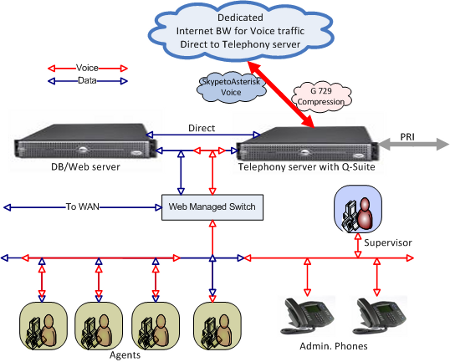Hybrid Cloud vs. Multi-Cloud: Which is Best for Your Data Center?
The use of cloud computing has become increasingly popular for businesses of all sizes. The ability to store, access, and process data remotely has made cloud computing a game-changer in the technology industry. However, businesses are now faced with a new decision: hybrid cloud vs. multi-cloud. While both options have their advantages, it's important to understand the differences between the two to determine which is best for your data center.
Hybrid Cloud
Hybrid cloud is a combination of public
and private cloud services that are used together to provide greater
flexibility and scalability. A private cloud is hosted on a company's own
infrastructure, whereas a public cloud is hosted on an external provider's
infrastructure. With hybrid cloud, a company can leverage the benefits of both
public and private clouds while keeping sensitive data on its own
infrastructure.
One of the primary advantages of a hybrid cloud is the ability to optimize workloads based on their specific requirements. For example, a company can run applications that require high levels of security on a private cloud, while using a public cloud for applications that require greater scalability. In addition, hybrid cloud solutions can be more cost-effective than using a private cloud alone, as it allows businesses to use public cloud resources when needed, reducing the need for expensive infrastructure.
Multi-Cloud
Multi-cloud, on the other hand, refers
to the use of multiple public cloud services from different providers. With
multi-cloud, businesses can choose the best services from different providers
to create a customized cloud environment that meets their specific needs. This
can be especially useful for companies with specific requirements, such as
compliance or data residency regulations, as they can select providers that
meet those requirements.
One of the primary advantages of a multi-cloud approach is that it provides greater flexibility and resilience. If one provider experiences downtime or performance issues, a company can quickly switch to another provider to minimize disruption. In addition, multi-cloud can help businesses avoid vendor lock-in, as they are not tied to a single provider's services.
Which is Best for Your Data Center?
Choosing between hybrid cloud and
multi-cloud depends on the specific needs of your business. If you require high
levels of security or have sensitive data that needs to be kept on your own
infrastructure, then hybrid cloud may be the best option for you. On the other
hand, if you require greater flexibility and resilience, and want to avoid
vendor lock-in, then multi-cloud may be the better choice.
Ultimately, the decision between hybrid
cloud and multi-cloud depends on your specific requirements and goals. By
evaluating the benefits and drawbacks of each approach, you can determine which
option is best for your data center and your business as a whole.
1.
Adoption Rates
According to a report by Flexera, in
2021, 92% of organizations are using a public cloud, while 80% are using a
private cloud. In terms of hybrid cloud adoption, the same report found that
87% of organizations have a hybrid cloud strategy in place, while 63% of
organizations are already using a hybrid cloud.
In terms of multi-cloud adoption, a
survey by RightScale found that 93% of organizations are using a multi-cloud
strategy, with an average of 2.2 public clouds and 2.2 private clouds per
organization.
2.
Benefits and Challenges
When it comes to the benefits and
challenges of hybrid cloud vs. multi-cloud, there are several key factors to
consider:
Benefits of Hybrid Cloud:
- Greater
control and security over sensitive data
- Cost-effectiveness
by leveraging public cloud resources
- Scalability
and flexibility to optimize workloads
- High
availability and disaster recovery options
Challenges of Hybrid Cloud:
- Complexity
in managing multiple environments
- Potential
for vendor lock-in with private cloud providers
- Security
and compliance risks with public cloud resources
Benefits of Multi-Cloud:
- Greater
flexibility and agility in choosing the best services from multiple
providers
- Avoidance
of vendor lock-in and increased negotiating power
- Improved
performance and resilience through workload distribution
- Ability
to meet specific compliance or regulatory requirements
Challenges of Multi-Cloud:
- Complexity
in managing multiple providers and environments
- Potential
for increased costs and complexity in integrating services
- Security
and compliance risks with multiple providers and environments
3.
Use Cases
Both hybrid cloud and multi-cloud have
their strengths and weaknesses when it comes to specific use cases. Here are a
few examples: You can check upcoming market trends in cloud here.
Use Cases for Hybrid Cloud:
- Healthcare
organizations that need to store and manage sensitive patient data in a
private cloud, while using a public cloud for non-sensitive applications
- Financial
institutions that require high levels of security and control over their
data, but also need to leverage public cloud resources for scalability and
flexibility
- E-commerce
companies that need to manage large volumes of data and traffic, but also
require the ability to scale up and down quickly depending on demand
Use Cases for Multi-Cloud:
- Global
enterprises that operate in multiple regions and require a mix of public
cloud providers to meet specific regulatory or compliance requirements
- Startups
or small businesses that require flexibility and agility in choosing the
best services from multiple providers, without being locked into a single
provider's services
- Businesses
that require high availability and disaster recovery options across
multiple providers to minimize downtime and ensure business continuity
Both hybrid cloud and multi-cloud have
their advantages and disadvantages, and the choice between them depends on your
specific needs and goals. By carefully evaluating your options and
understanding the benefits and challenges of each approach, you can make an
informed decision that will help your business thrive in the cloud era.


.png)



Comments
Post a Comment